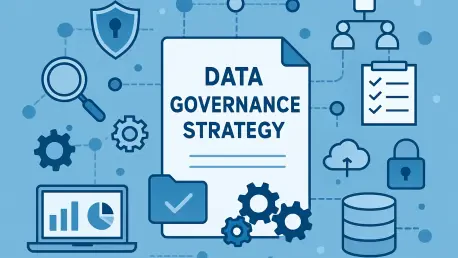What happens when a company’s most valuable asset becomes its biggest liability? In today’s digital landscape, where data drives every decision, a single misstep in managing this resource can lead to catastrophic breaches, eroded trust, and staggering fines. Yet, amidst this high-stakes environment, organizations that master the art of data governance are not just surviving—they’re thriving. This critical framework transforms chaos into clarity, turning raw information into a powerful tool for innovation and competitive advantage. Dive into the unseen force propelling modern businesses toward unparalleled success.
The Silent Powerhouse Behind Business Growth
Data has become the lifeblood of modern enterprises, fueling everything from customer insights to operational strategies. However, without a structured approach to manage it, this asset quickly turns into a source of confusion and risk. Data governance steps in as the silent powerhouse, ensuring that information remains accurate, secure, and aligned with business goals. It’s not merely a technical necessity but a strategic imperative that underpins trust and scalability in an era where digital transformation is non-negotiable.
This discipline goes beyond preventing disasters; it positions organizations to seize opportunities with confidence. By establishing clear rules and accountability, governance enables teams to harness data for innovation while mitigating vulnerabilities. As businesses navigate an increasingly complex regulatory landscape, the importance of this framework cannot be overstated—it’s the foundation upon which sustainable growth is built.
Navigating the Data Flood in a Hyper-Connected Era
The sheer volume of data generated daily is staggering, with global creation rates climbing at an unprecedented pace. Without a robust system to manage this deluge, organizations face operational bottlenecks, regulatory penalties, and damaged reputations. Data governance provides the necessary structure to filter, secure, and utilize this influx, turning potential chaos into actionable insights.
Small startups and large enterprises alike grapple with the challenge of inconsistent data practices, often leading to costly inefficiencies. A lack of clear policies can result in duplicated efforts or misinformed decisions, stalling progress. Governance acts as a lifeline, offering a roadmap to streamline processes and protect against the pitfalls of unchecked data expansion in a world where connectivity amplifies every error.
Five Pillars of Transformation Through Data Governance
Data governance delivers profound benefits that reshape organizational dynamics across multiple fronts. First, it ensures data quality, providing a reliable foundation for decision-making. For example, standardized definitions have helped initiatives like Feeding America clarify complex issues for policymakers tackling food insecurity, showcasing the power of precision.
Second, governance upholds ethics and compliance, critical in a landscape where 79% of the global population falls under privacy laws, according to industry reports. Frameworks adopted by entities like Delta Dental Michigan prevent bias in AI applications while adhering to stringent regulations. Third, it fosters communication, aligning departments with consistent data standards—Freddie Mac’s streamlined strategies exemplify how silos can be dismantled.
Fourth, governance sharpens decision-making, enabling swift, data-driven actions, as seen in USTRANSCOM’s logistical advancements. Finally, it drives efficiency, cutting costs by optimizing existing resources—Becks Hybrids dramatically reduced query times after implementing targeted upgrades. These pillars collectively elevate organizations, addressing specific challenges while paving the way for broader achievements.
Lessons from the Frontlines of Data Management
Industry leaders and real-world applications bring the impact of data governance into sharp focus. Kelle O’Neal, a prominent figure in data strategy, emphasizes that governance is the key to trusted analytics and AI, unlocking innovation. Robert S. Seiner, another expert, highlights how it builds confidence in data lineage, minimizing risks in high-stakes environments.
Compelling stories further illustrate this value. In the energy sector, E.ON bridged data silos through governance, fueling advancements in renewable solutions. Similarly, Estonia’s government leveraged a system called X-Road to balance transparency with privacy, enhancing citizen trust. These examples, paired with expert insights, underscore that governance is not a theoretical concept but a proven catalyst for tangible results across diverse fields.
Building a Governance Framework That Fits
Starting a data governance journey need not be overwhelming; practical steps can make it an achievable goal for any organization. Begin by targeting a specific data domain or project to showcase quick wins, avoiding the pitfalls of overly ambitious plans. This focused approach builds momentum and demonstrates value to stakeholders.
Tailoring strategies to organizational scale and industry context is essential—retail giants like Abercrombie & Fitch balance personalization with privacy through customized frameworks. Integrating governance into existing workflows minimizes disruption, while investing in education through resources like data stewardship learning plans equips teams for long-term success. Tracking metrics, such as the 58% improvement in data quality reported by many organizations, allows for continuous refinement, ensuring governance remains a dynamic ally rather than a static burden.
Reflecting on a Data-Driven Legacy
Looking back, the journey through the intricacies of data governance revealed a transformative force that reshaped how organizations operated. It became clear that this framework was not just a shield against risks but a catalyst for innovation, efficiency, and trust. Every story shared and statistic uncovered painted a picture of businesses that once struggled with data chaos but found clarity through structured management.
As the digital landscape continues to evolve, the next steps for any organization lie in embracing governance with intentionality. Prioritizing small, measurable initiatives can set the stage for broader impact, while fostering a culture of data literacy ensures sustained progress. The future demands adaptability—those who invest in governance now will stand ready to navigate tomorrow’s challenges with unshakable confidence.









